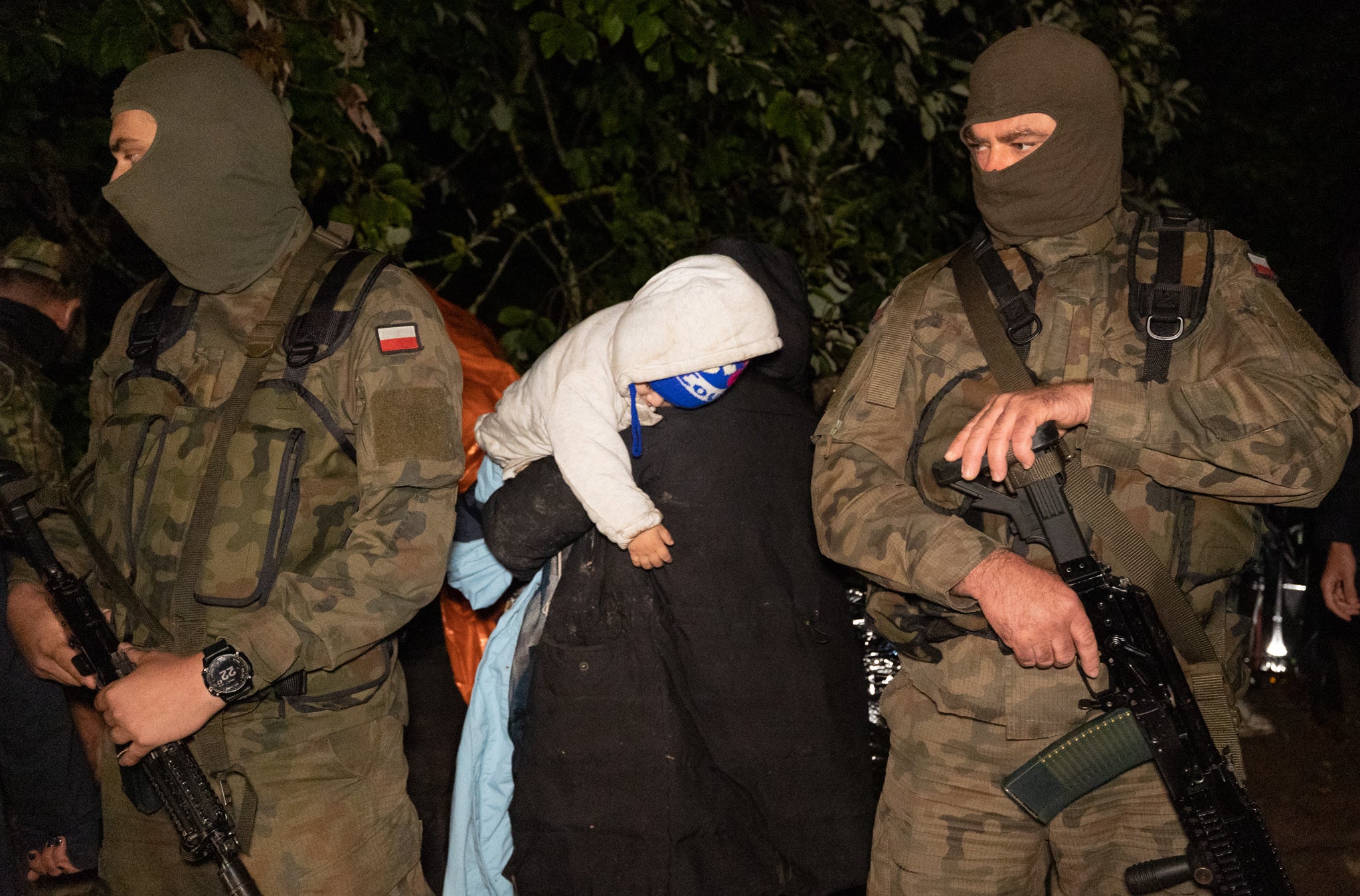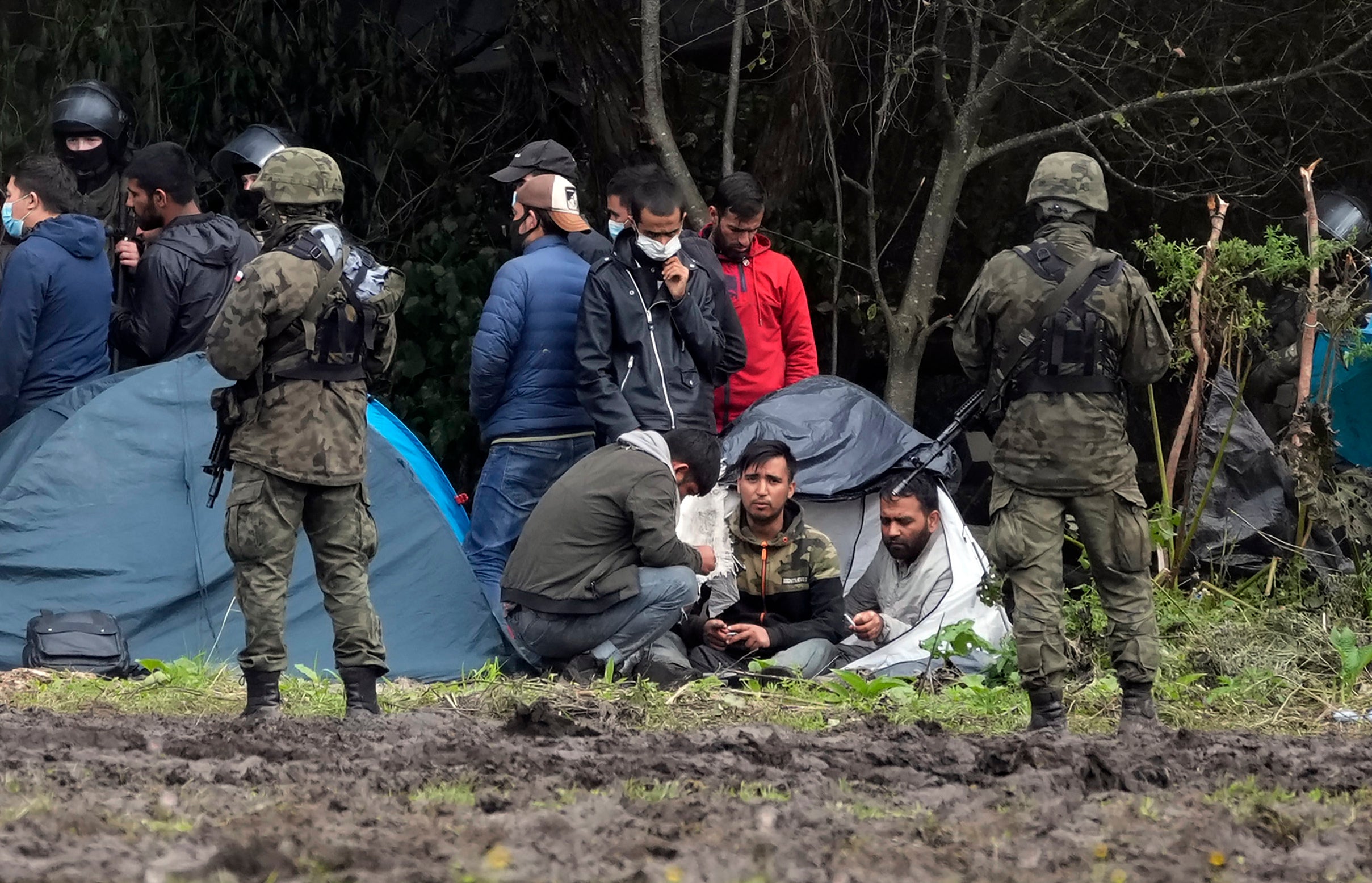Playing games with people’s lives: The migrants trapped at the Poland, Belarus border
Desperate for a new life, some migrants find themselves trapped by politics and a European border, reports Rory Sullivan


The Polish and Belarusian governments are “playing games” with the lives of migrants trapped along the border between the two countries, charity workers and locals have warned.
After a steep increase in crossings from Belarus this summer, Warsaw heightened its border security and temporarily legalised pushbacks to thwart asylum claims, even though the policy is illegal under international law.
The Polish government blames its neighbour over the issue, suggesting that Alexander Lukashenko’s regime is encouraging asylum seekers’ attempts to enter the European Union in retaliation for sanctions brought against it by Brussels.
Citing the unprecedented nature of the situation, Poland’s leaders introduced a state of emergency in early September in the border regions of Podlaskie and Lubelskie. The move, which was recently extended for a further two months, limits oversight of its actions, as it bars journalists and NGO staff from entering these areas.
In the hinterland between Poland and Belarus, migrants are therefore left struggling out of sight in forests and marshland. They lack adequate food, water, clothes and shelter, wedged between two hostile border forces.
“If they are at the border, they are forced with guns to go to the Polish side. And the Polish side are forcing them to go back to the Belarusian side,” says Katarzyna Czarnota, a sociologist at Adam Mickiewicz University in Poznan, Poland.
Ms Czarnota, who volunteers for the newly-formed Grupa Granica, an initiative comprising charity workers, activists and researchers, tells The Independent about her fears for the safety of those stuck in the border zone.
The PhD student then turns to the unknown scale of the humanitarian crisis. “We don’t know how many people are dying in the forest,” she says, referring to how she and others are barred from the area.
“It’s like a game is being played with human life. There are no strict rules,” she adds.
So far, six asylum seekers have already died from causes including hypothermia and exhaustion, according to Polish migration charities.
Ms Czarnota recalls how her friends recently tried to call an ambulance to help four young migrants in the forest. The official who picked up said he would not send support to “illegal immigrants”, regardless of whether or not they were dying. “This is the result of state propaganda against people on the move,” she says.
Marta Górczyńska, a human rights lawyer who is also part of Grupa Granica, is shocked by what is happening. “For me, it was a new situation. I have been working with refugees in Poland for 10 years, also monitoring this border, also providing direct legal assistance. But never in such circumstances where I’d have to find people in the forest and then check if they’re alive or need urgent medical assistance.”
She stresses the wide make-up of those attempting to cross the border. “All kinds of people are there: older people, younger people, men, women, very small children, families travelling together.”
Usually an organisation like Grupa Granica would monitor and document human rights violations, but instead it has, out of necessity, adapted to provide humanitarian assistance to those in need.
They are supported in this work by a network of locals, who distribute food, water and warm clothes. Paulina, who wants to remain anonymous, is one of these volunteers. Before August, she had never worked with migrants. But this changed when she saw what was occurring near her village.
“The behaviour and the decisions of the government and the things that are done at the border are absolutely cruel. Everything that happens here is against human law. I think it must stop because we will be finding dead bodies, corpses all over our area in a month,” she tells me.
As a mother herself, Paulina found it distressing when she heard a baby’s cries in the forest at night on one of her recent rounds. She followed the noise, until she realised the child was on the Belarusian side and there was nothing she could do to help.
If they are at the border, they are forced with guns to go to the Polish side. And the Polish side are forcing them to go back to the Belarusian side
On Monday, she and her friends were alerted to a group of eight asylum seekers in distress. They found six men and two women – from Guinea, Ethiopia and Congo – in a bad condition, lying on wet ground.
“This man from Ethiopia, he was crying all the time. When we arrived, he grabbed my leg and kissed my hands because he knew I had come to help him,” says Paulina.
When the emergency services turned up, so did the border guards, who threatened Paulina and her colleagues with people-smuggling offences. Some of the migrants were taken to hospital, but Paulina has no idea where they are now. “They were probably pushed back because this is what usually happens,” she says, her voice deflated.
A report published last week by Amnesty International suggests this policy was also used to thrust a group of 32 Afghans, including women and children, back into Belarus. Using spatial modelling techniques, the researchers found their makeshift camp was forcibly moved out of Poland in mid-August. It is not known how the individuals are faring now.
Eve Geddie, director of Amnesty International’s European Institutions Office, thinks the purpose of the state of emergency is to cut off access and medical assistance, and to hide people’s suffering. “To make the situation for this group so bad that they leave; although they have nowhere else to go, of course,” she says.
Fearing that more people could die, Ms Geddie wants the EU to “put its foot down with Poland”, possibly through legal action for breaching its laws. “We can’t have blackout zones for human rights, without the eyes of NGOs and the media. I don’t think that can be allowed to happen.”
Ms Geddie would also like members of the bloc to agree to a clear resettlement mechanism for migrants, so that each country takes its fair share. This will prevent the scenes at the Polish-Belarusian border from happening again, she says.
For its part, the Polish government denounces Belarus’s “hybrid war” and rails against the 9,700 attempted crossings made since 1 August. It also whips up anti-immigration sentiment at home by claiming – with dubious evidence – that a sizeable proportion of the new arrivals have links to Isis.
Without concrete evidence, one Polish official tells me 10 per cent of the 1,200 asylum seekers who have been detained since last month are terrorists and that 20 per cent of them have ties with Russia, Poland’s former ruler.

As part of this smear campaign, the Polish government recently gave a press conference in which it accused migrants of many crimes. In this presentation, officials showed a picture of a man engaging in bestiality, saying he was an asylum seeker who had entered Poland. In reality, the image, found to have been taken from a pornography site on the dark web, was simply used to fit the Law and Justice (PiS) party’s narrative that it is protecting the security of the EU’s external border.
Such rhetoric appears to be reaping political dividends.
“The Belarusian border crisis has boosted, but not transformed, the poll ratings of Poland’s right-wing ruling party, as most Poles have backed its tough stance on controlling migration,” says Aleks Szczerbiak, professor of politics and contemporary European studies at the University of Sussex.
But for people like Paulina, the government’s policy is abhorrent. Although she will continue her work on the border, she fears she could face trumped-up people-smuggling charges.
“Yes, of course I’m afraid: I’ve got small kids. It will be difficult for me to go to prison,” she says. “I’m scared of my country because it’s not only against refugees but it’s also against its own citizens.”






Join our commenting forum
Join thought-provoking conversations, follow other Independent readers and see their replies
1Comments